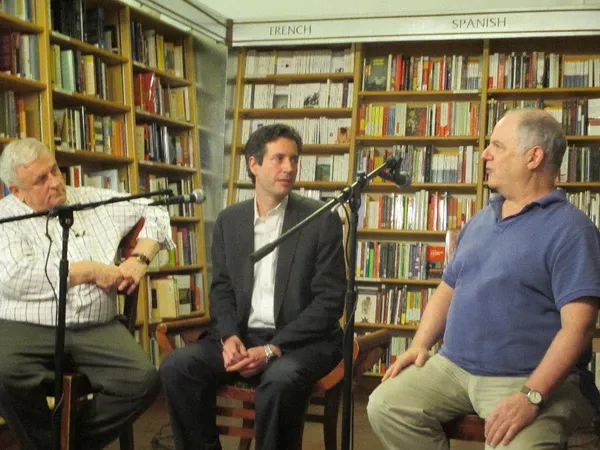 |
| Edmund White and Frank Rich with Antonin Baudry at Quai d’Orsay - Weapons of Mass Diplomacy Drawing The Line at McNally Jackson in New York: "I remember it was really like being in film school." |
Bertrand Tavernier's The French Minister (Quai D’Orsay) stars Thierry Lhermitte, Raphaël Personnaz, Niels Arestrup and Anaïs Demoustier, with Jane Birkin impersonating a version of Toni Morrison and Julie Gayet as a potent advisor.
Eric Rohmer, Jean-Luc Godard and going beyond Mel Brooks with Frankenstein and the Seven Dwarfs are discussed in the second half of my conversation with Bertrand Tavernier and Antonin Baudry.
At McNally Jackson Books in New York, two days before July 4, Edmund White and Frank Rich were discussing Drawing The Line with Antonin Baudry. Here is a highlight.
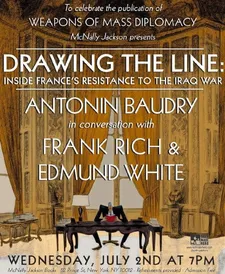 |
| Weapons of Mass Diplomacy Drawing The Line invitation |
Anne-Katrin Titze: The past times we spoke, Bertrand Tavernier was always in the room. Is there a secret about turning the book into the script that you couldn't tell me in front of your director?
Antonin Baudry: I remember it was really like being in film school. It was a long process because he could talk a lot and a lot about scenes from ancient films and not that ancient. It was really great. I didn't know anything about writing a film and each time I was trying to do something he was like, "oh no, you are making the same mistake as Howard Hawks [in a certain scene]." During the night I was trying to watch the movies. He was offering me a lot of DVDs but they didn't work because of the zoning. No, it was great. He is a very generous man. There is no secret. I mean, there are.
AKT: But you wouldn't tell, of course.
Edmund White: Bertrand Tavernier really wanted to do the movie. He flew over here to convince you, right?
AB: Yes. In the beginning, I didn't think it was a good idea. And then he really convinced me. I was very sick when I saw him. I thought I would die the following day. So I thought, I will not keep him from doing that. Now I am happy. It was a great decision and a great, great experience.
Frank Rich: I was also struck by certain similarities to America. Except, I think it's a gentle satire. These people are not evil. They may be neurotic, obsessed and relentless. [In the graphic novel] there's more of a feel of a film Jacques Tati were doing, much rather than Stanley Kubrick. Not so dark. It also has a good ending. It's kind of refreshing. I am so steeped in that history.
We also learned from Bertrand Tavernier and Antonin Baudry about the ego of many French politicians, working with cats and shoe obsessions.
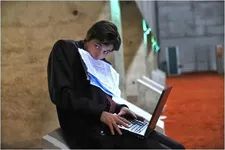 |
| Raphaël Personnaz as Arthur: "Arthur in The French Minister comes with no knowledge at all." |
Anne-Katrin Titze: There are some funny visual details on life at the ministry. The cat and the sneakers in the safe, for example are both inherited. Did they come from the real world?
Bertrand Tavernier: The cat is real. The cat belonged to the predecessor. He kept the cat and the furniture. He never spent one cent of public money to change the office, which I think is remarkable. Because the ego of many French politicians, Chiefs of Staff, is so big that they have to change the furniture, the curtains. And this is public money they spend. At a screening for the [French] Ministry I met a guy who said "I was the cat owner. That was my cat." The sneakers were an invention.
Antonin Baudry: They're an emblem. He puts his feet into the shoes of his predecessor and into the function. It's symbolic.
AKT: In combination with the cat, it had a Bell, Book and Candle flair to it. [Richard Quine's 1958 movie, in which James Stewart is bewitched by Kim Novak and her cat]
BT: The cat was important. It could have been even more important because Antonin told me that the Minister was allergic to cats. But it's very difficult to work with a cat.
AB: In a film it's really difficult. In a comic it's easy because you just have to draw it. Actually, it's more developed in the comic. The cat is the character's soul.
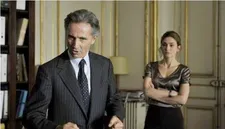 |
| Thierry Lhermitte as the French Minister with Julie Gayet as Valerie Dumontheil: "The things he picks from the books are really bizarre but it's part of his universe." |
BT: It's difficult filming with a cat. Although it adopted Niels Arestrup. The cat gave us a wonderful line in the end credits. For reasons I will never know, the actress playing the secretary invented the name for the cat Pol Pot. The idea of naming a cat Pol Pot is so incredible. I kept it, because who would be mad enough to give that name to a cat?
AKT: The theme of shoes also is running through the story. I read that square-toed shoes are making a comeback in 2015.
AB: That's bad news. That's really bad news. I hate them.
AKT: So do I. Or so I say now. Did you really go to your first day of work with dirty shoes?
AB: I am obsessed with shoes. Not really, but I think diplomats are. It's a symbol of appearance. I think that shoes embody a kind of attention to yourself. When I arrived for my first day of work I didn't know any of the codes and I had never met a diplomat before. The shoes were the first thing people remarked there. You can pick out diplomats by their shiny shoes.
AKT: I wrote down this quote from the film - "It's like Frankenstein talking to Snow White".
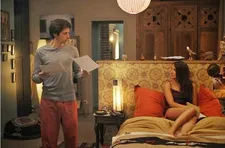 |
| Anaïs Demoustier as Marina with Raphaël Personnaz as Arthur: "You can pick out diplomats by their shiny shoes." |
BT: And the Seven Dwarfs. This is summing up the absurdity of the speech. It's like Frankenstein trying to make sense to the Seven Dwarfs. I love that line. And he was right, the speech was very badly received. In one line you sum up the absurdity of a language which is absolutely not adapted. Frankenstein wouldn't know how to communicate with the Seven Dwarfs, even if he wanted to.
AKT: There is your next movie!
BT: It's much beyond Mel Brooks.
AKT: Have you ever been "frozen with fear"? [I am quoting Heraclitus - "A fool who must orate is frozen with fear" - used in the book and film as one of the chapter headings.]
AB: Heraclitus is very important for the film. He is a very distant philosopher. He is a kind of counterpoint to the people who are living without any kind of distance.
BT: It's also making fun of all the films using chapters. Nobody can beat Heraclitus for the density of the obscurity. And the fact that it looks very meaningful.
AKT: I am always amazed by the freedom with which you use material and make it completely your own.
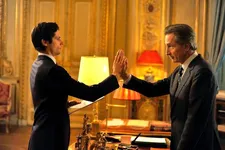 |
| High Five: "In one line you sum up the absurdity of a language which is absolutely not adapted." |
BT: I always go into a project and preserve the freedom. Freedom is only working if you have respect and love for the material. I think I learned that with jazz. I learned freedom through jazz. My four last films, between Safe Conduct, In the Electric Mist, The Princess Of Montpensier and this film - I am proud that it shows that I have some kind of range of imagination. And the desire to learn. I try to grab Louisiana and the essence of the Renaissance. In all of them I was dealing with a character who knew only about 20 or 30% of what was happening. Arthur in The French Minister comes with no knowledge at all. Or the Princess, she was as ignorant as the modern audience.
AKT: With this Tavernier-ian freedom, were you ever concerned about your baby?
AB: Never. We wrote the screenplay together, the three of us, Bertrand, Christophe [Blain] and me. The more we were free and went outside the book, the more happy I was with it. Trying to imagine new things with him.
AKT: When did you realise that you loved working with screenwriters?
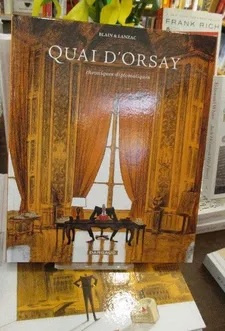 |
| Quai D’Orsay: "It's much beyond Mel Brooks." |
BT: Very early. When I had the first screening of The Clockmaker of St.Paul, I invited my two screenwriters Jean Aurenche and Pierre Bost. Veterans! And Pierre Bost said, "Bertrand, you made the film which is more personal, more autobiographical, closer to you, because you worked with us. Because we forced you, we helped you."
Some directors, Eric Rohmer, Jean-Luc Godard, they will never work with somebody else. I never overcame my fear of the blank page. So I need to have somebody to impress. I don't know why so many directors never invite their screenwriters to screenings, never want to see them. I cannot understand that. I was reading a book on The Searchers and John Ford was treating his screenwriter Frank Nugent in the most horrible way. He was never invited to any screening of the film.
AKT: The characters in your films are very complex. There is always a surplus. Maybe it has something to do with the different voices creating them? After seeing a film of yours, I could wonder, why are people in real life often so predictable? There is a red book on the cover of the English language version of the graphic novel. Can you explain its role?
AB: This book contains two volumes published in France together. We chose this cover because it really embodies the whole story, much of it takes place in New York. And this is a reference to the Heraclitus book and to the fact that at the end of the day it is also related to books, not only to politics. The minister is an obsessive writer and reader of philosophy. The things he picks from the books are really bizarre but it's part of his universe. It was important to have a book on the cover. And a red one was to terrify the American audience.
In the first half of my conversation with Bertrand Tavernier and Antonin Baudry, we discussed Niels Arestrup channeling the working methods of Cary Grant and Rosalind Russell in His Girl Friday or the serious madness surrounding Peter Sellers in The Party. Howard Hawks, Billy Wilder, Blake Edwards, Jacques Becker, Stanley Kubrick and John Ford pop up in precise reference throughout the conversation.





















